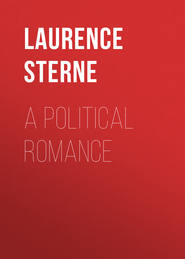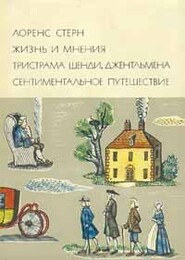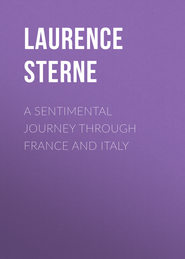По всем вопросам обращайтесь на: info@litportal.ru
(©) 2003-2025.
✖
The Life and Opinions of Tristram Shandy, Gentleman
Настройки чтения
Размер шрифта
Высота строк
Поля
–I believe not, replied my uncle Toby, after some pause—for being inland, as I said, and having Silesia and Moravia to the east; Lusatia and Upper Saxony to the north; Franconia to the west; and Bavaria to the south; Bohemia could not have been propell'd to the sea without ceasing to be Bohemia—nor could the sea, on the other hand, have come up to Bohemia, without overflowing a great part of Germany, and destroying millions of unfortunate inhabitants who could make no defence against it—Scandalous! cried Trim—Which would bespeak, added my uncle Toby, mildly, such a want of compassion in him who is the father of it—that, I think, Trim—the thing could have happen'd no way.
The corporal made the bow of unfeign'd conviction; and went on.
Now the King of Bohemia with his queen and courtiers happening one fine summer's evening to walk out—Aye! there the word happening is right, Trim, cried my uncle Toby; for the King of Bohemia and his queen might have walk'd out or let it alone:—'twas a matter of contingency, which might happen, or not, just as chance ordered it.
King William was of an opinion, an' please your honour, quoth Trim, that every thing was predestined for us in this world; insomuch, that he would often say to his soldiers, that 'every ball had its billet.' He was a great man, said my uncle Toby—And I believe, continued Trim, to this day, that the shot which disabled me at the battle of Landen, was pointed at my knee for no other purpose, but to take me out of his service, and place me in your honour's, where I should be taken so much better care of in my old age—It shall never, Trim, be construed otherwise, said my uncle Toby.
The heart, both of the master and the man, were alike subject to sudden over-flowings;—a short silence ensued.
Besides, said the corporal, resuming the discourse—but in a gayer accent—if it had not been for that single shot, I had never, 'an please your honour, been in love—
So, thou wast once in love, Trim! said my uncle Toby, smiling—
Souse! replied the corporal—over head and ears! an' please your honour. Prithee when? where?—and how came it to pass?—I never heard one word of it before; quoth my uncle Toby:—I dare say, answered Trim, that every drummer and serjeant's son in the regiment knew of it—It's high time I should—said my uncle Toby.
Your honour remembers with concern, said the corporal, the total rout and confusion of our camp and army at the affair of Landen; every one was left to shift for himself; and if it had not been for the regiments of Wyndham, Lumley, and Galway, which covered the retreat over the bridge Neerspeeken, the king himself could scarce have gained it—he was press'd hard, as your honour knows, on every side of him—
Gallant mortal! cried my uncle Toby, caught up with enthusiasm—this moment, now that all is lost, I see him galloping across me, corporal, to the left, to bring up the remains of the English horse along with him to support the right, and tear the laurel from Luxembourg's brows, if yet 'tis possible—I see him with the knot of his scarfe just shot off, infusing fresh spirits into poor Galway's regiment—riding along the line—then wheeling about, and charging Conti at the head of it—Brave, brave, by heaven! cried my uncle Toby—he deserves a crown—As richly, as a thief a halter; shouted Trim.
My uncle Toby knew the corporal's loyalty;—otherwise the comparison was not at all to his mind—it did not altogether strike the corporal's fancy when he had made it—but it could not be recall'd—so he had nothing to do, but proceed.
As the number of wounded was prodigious, and no one had time to think of any thing but his own safety—Though Talmash, said my uncle Toby, brought off the foot with great prudence—But I was left upon the field, said the corporal. Thou wast so; poor fellow! replied my uncle Toby—So that it was noon the next day, continued the corporal, before I was exchanged, and put into a cart with thirteen or fourteen more, in order to be convey'd to our hospital.
There is no part of the body, an' please your honour, where a wound occasions more intolerable anguish than upon the knee—
Except the groin; said my uncle Toby. An' please your honour, replied the corporal, the knee, in my opinion, must certainly be the most acute, there being so many tendons and what-d'ye-call-'ems all about it.
It is for that reason, quoth my uncle Toby, that the groin is infinitely more sensible—there being not only as many tendons and what-d'ye-call-'ems (for I know their names as little as thou dost)—about it—but moreover …—
Mrs. Wadman, who had been all the time in her arbour—instantly stopp'd her breath—unpinn'd her mob at the chin, and stood upon one leg—
The dispute was maintained with amicable and equal force betwixt my uncle Toby and Trim for some time; till Trim at length recollecting that he had often cried at his master's sufferings, but never shed a tear at his own—was for giving up the point, which my uncle Toby would not allow—'Tis a proof of nothing, Trim, said he, but the generosity of thy temper—
So that whether the pain of a wound in the groin (caeteris paribus) is greater than the pain of a wound in the knee—or
Whether the pain of a wound in the knee is not greater than the pain of a wound in the groin—are points which to this day remain unsettled.
Chapter 4.XLIV
The anguish of my knee, continued the corporal, was excessive in itself; and the uneasiness of the cart, with the roughness of the roads, which were terribly cut up—making bad still worse—every step was death to me: so that with the loss of blood, and the want of care-taking of me, and a fever I felt coming on besides—(Poor soul! said my uncle Toby)—all together, an' please your honour, was more than I could sustain.
I was telling my sufferings to a young woman at a peasant's house, where our cart, which was the last of the line, had halted; they had help'd me in, and the young woman had taken a cordial out of her pocket and dropp'd it upon some sugar, and seeing it had cheer'd me, she had given it me a second and a third time—So I was telling her, an' please your honour, the anguish I was in, and was saying it was so intolerable to me, that I had much rather lie down upon the bed, turning my face towards one which was in the corner of the room—and die, than go on—when, upon her attempting to lead me to it, I fainted away in her arms. She was a good soul! as your honour, said the corporal, wiping his eyes, will hear.
I thought love had been a joyous thing, quoth my uncle Toby.
'Tis the most serious thing, an' please your honour (sometimes), that is in the world.
By the persuasion of the young woman, continued the corporal, the cart with the wounded men set off without me: she had assured them I should expire immediately if I was put into the cart. So when I came to myself—I found myself in a still quiet cottage, with no one but the young woman, and the peasant and his wife. I was laid across the bed in the corner of the room, with my wounded leg upon a chair, and the young woman beside me, holding the corner of her handkerchief dipp'd in vinegar to my nose with one hand, and rubbing my temples with the other.
I took her at first for the daughter of the peasant (for it was no inn)—so had offer'd her a little purse with eighteen florins, which my poor brother Tom (here Trim wip'd his eyes) had sent me as a token, by a recruit, just before he set out for Lisbon—
–I never told your honour that piteous story yet—here Trim wiped his eyes a third time.
The young woman call'd the old man and his wife into the room, to shew them the money, in order to gain me credit for a bed and what little necessaries I should want, till I should be in a condition to be got to the hospital—Come then! said she, tying up the little purse—I'll be your banker—but as that office alone will not keep me employ'd, I'll be your nurse too.
I thought by her manner of speaking this, as well as by her dress, which I then began to consider more attentively—that the young woman could not be the daughter of the peasant.
She was in black down to her toes, with her hair conceal'd under a cambric border, laid close to her forehead: she was one of those kind of nuns, an' please your honour, of which, your honour knows, there are a good many in Flanders, which they let go loose—By thy description, Trim, said my uncle Toby, I dare say she was a young Beguine, of which there are none to be found any where but in the Spanish Netherlands—except at Amsterdam—they differ from nuns in this, that they can quit their cloister if they choose to marry; they visit and take care of the sick by profession—I had rather, for my own part, they did it out of good-nature.
–She often told me, quoth Trim, she did it for the love of Christ—I did not like it.—I believe, Trim, we are both wrong, said my uncle Toby—we'll ask Mr. Yorick about it to-night at my brother Shandy's—so put me in mind; added my uncle Toby.
The young Beguine, continued the corporal, had scarce given herself time to tell me 'she would be my nurse,' when she hastily turned about to begin the office of one, and prepare something for me—and in a short time—though I thought it a long one—she came back with flannels, &c. &c. and having fomented my knee soundly for a couple of hours, &c. and made me a thin bason of gruel for my supper—she wish'd me rest, and promised to be with me early in the morning.—She wish'd me, an' please your honour, what was not to be had. My fever ran very high that night—her figure made sad disturbance within me—I was every moment cutting the world in two—to give her half of it—and every moment was I crying, That I had nothing but a knapsack and eighteen florins to share with her—The whole night long was the fair Beguine, like an angel, close by my bed-side, holding back my curtain and offering me cordials—and I was only awakened from my dream by her coming there at the hour promised, and giving them in reality. In truth, she was scarce ever from me; and so accustomed was I to receive life from her hands, that my heart sickened, and I lost colour when she left the room: and yet, continued the corporal (making one of the strangest reflections upon it in the world)–'It was not love'—for during the three weeks she was almost constantly with me, fomenting my knee with her hand, night and day—I can honestly say, an' please your honour—that…once.
That was very odd, Trim, quoth my uncle Toby.
I think so too—said Mrs. Wadman.
It never did, said the corporal.
Chapter 4.XLV
—But 'tis no marvel, continued the corporal—seeing my uncle Toby musing upon it—for Love, an' please your honour, is exactly like war, in this; that a soldier, though he has escaped three weeks complete o'Saturday night,—may nevertheless be shot through his heart on Sunday morning—It happened so here, an' please your honour, with this difference only—that it was on Sunday in the afternoon, when I fell in love all at once with a sisserara—It burst upon me, an' please your honour, like a bomb—scarce giving me time to say, 'God bless me.'
I thought, Trim, said my uncle Toby, a man never fell in love so very suddenly.
Yes, an' please your honour, if he is in the way of it—replied Trim.
I prithee, quoth my uncle Toby, inform me how this matter happened.
–With all pleasure, said the corporal, making a bow.
Chapter 4.XLVI
I had escaped, continued the corporal, all that time from falling in love, and had gone on to the end of the chapter, had it not been predestined otherwise—there is no resisting our fate.
It was on a Sunday, in the afternoon, as I told your honour.
The old man and his wife had walked out—
Every thing was still and hush as midnight about the house—
There was not so much as a duck or a duckling about the yard—
–When the fair Beguine came in to see me.
My wound was then in a fair way of doing well—the inflammation had been gone off for some time, but it was succeeded with an itching both above and below my knee, so insufferable, that I had not shut my eyes the whole night for it.
Let me see it, said she, kneeling down upon the ground parallel to my knee, and laying her hand upon the part below it—it only wants rubbing a little, said the Beguine; so covering it with the bed-clothes, she began with the fore-finger of her right hand to rub under my knee, guiding her fore-finger backwards and forwards by the edge of the flannel which kept on the dressing.











